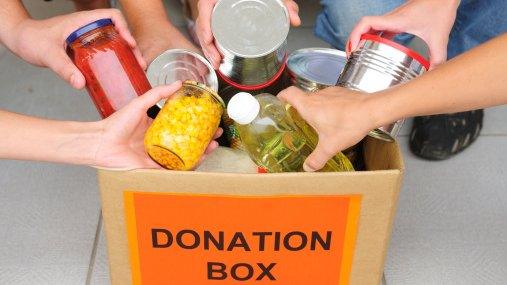Trussell Trust says food parcel numbers hit new high
- Published
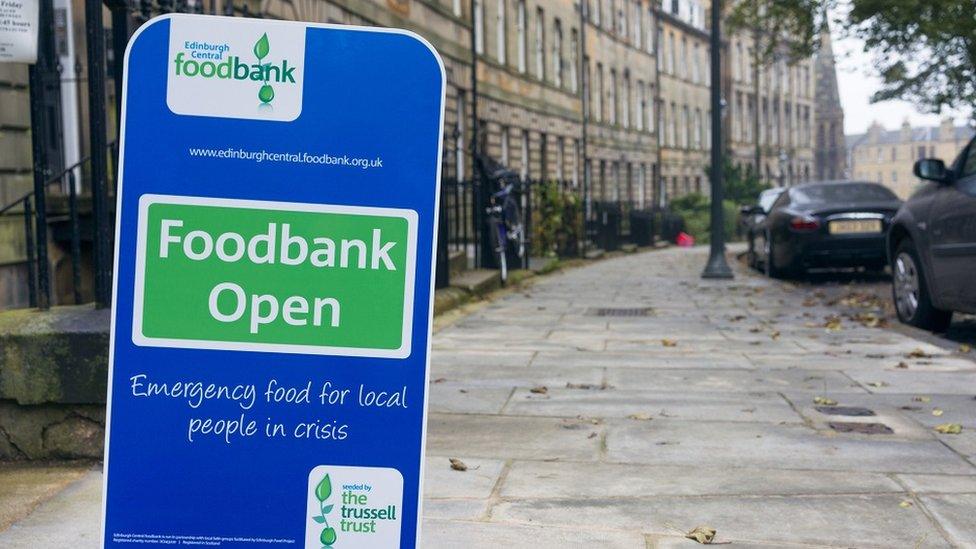
The number of emergency food parcels handed out by food banks in Scotland hit a record high last year, according to new statistics.
The Trussell Trust says its food banks provided more than 145,000 packages to people in crisis in 2016-17.
It marks a 9% increase on the previous year - a trend the charity blamed on benefit payment problems and low incomes.
The UK government said the reasons for food bank use were "complex".
"It's misleading to link them to any one issue," a spokesman for the Department for Work and Pensions (DWP) added.
'Worrying stories'
The new report by The Trussell Trust examines the activity of its network of 52 food banks north of the border.
It reveals that 47,955 children in Scotland were among those it helped with three-day emergency food supplies last year.
And it found that low income was the single biggest reason for referral to a Scottish food bank - affecting a quarter of those referred.
Problems with benefits were also a major factor.
Around 24% of those referred to the charity had suffered benefit delays, while 18% encountered difficulties with benefit changes.
But its own statistics also reveal that the growth of food banks has slowed since 2014/15, when food bank use increased by two-thirds in 12 months.
Meanwhile a UK-wide report by the charity found that food banks in areas where the Universal Credit system has been rolled out are reporting increased demand.
The research, which includes some areas of Scotland, found that there has been a 16.85% average increase in referrals, compared to a nationwide average of 6.64%.
The number of food parcels handed out in Scotland last year was enough to feed the entire population of Dundee for three days, according to the charity's Scotland network manager Ewan Gurr.
He said: "Despite nine Scottish local authorities showing a decrease in food bank use six months ago, it is clear that a cold Christmas, the rollout of Universal Credit and the ever-increasing pressure on the pockets of low-income individuals and families is yielding bitter outcomes.
"Worrying stories emanating from food banks highlight the reality that a record 12-month inflation rate of 2.3% and benefit delays attributed to the rollout of Universal Credit are leaving men, women and children up and down the country sitting at the dinner table with no food in front of them.
"With both council elections and a general election on the horizon, it is absolutely critical for confirmed as well as prospective candidates to put tackling hunger and food poverty front and centre of the policy agenda."

Ken Loch blamed benefits sanctions introduced by the UK government for the rise in foodbank use
Speaking at the STUC congress in Aviemore, film director Ken Loach accused the UK government of "conscious cruelty" by imposing benefit sanctions which he claims have led to an increase in the use of food banks.
His I, Daniel Blake film told the fictional story of a man denied employment and support allowance.
Mr Loach said: "When the sanctions increased, the use of foodbanks increased. If your money stops and you are dependent on social security, you haven't got a large bank account like Tory cabinet ministers - you have got nothing.
"And very shortly people have to take very tough choices - how do they survive? Often they don't eat.
"Last year there were figures that nearly half a million children eat because people put extra tins in a collecting bag - that cannot be right."

Case study: Alex, from South Lanarkshire
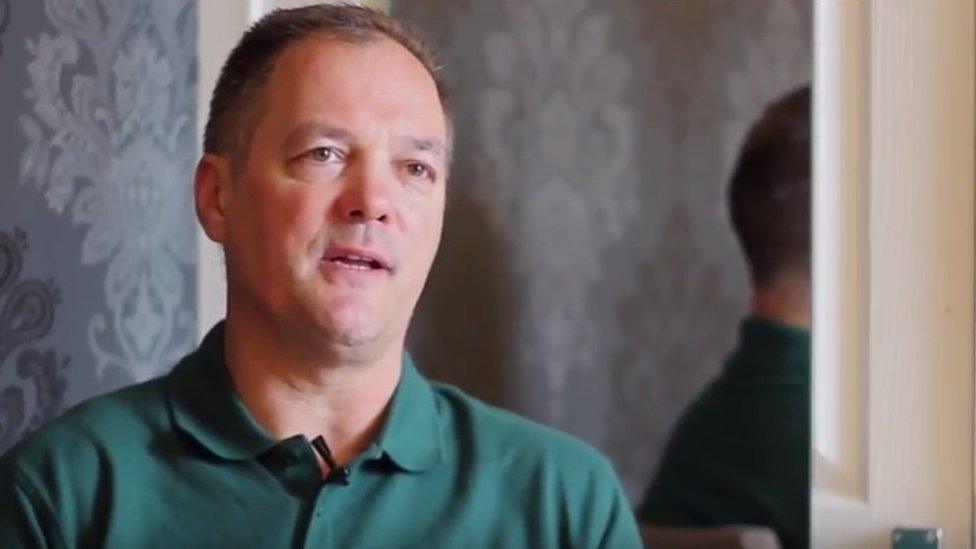
Alex turned to the food bank after his driving licence was taken off him
Alex told The Trussell Trust's You Tube channel, external that he hit difficulties when he returned to Scotland from New Zealand after his marriage broke up.
He said: "I'm a former Olympic athlete, I'm a former British champion, I've had my own businesses, I've had several businesses, and then all of a sudden everything came crashing down.
"If it hadn't have been for the food bank I'd have been in real big trouble [and] I wouldn't have been eating. I was on the brink. I was in a bad way."
He added: "All the people in the food bank were fantastic, they were really nice, they were really helpful and that was one of the reasons I wanted to give my time as a volunteer.
"It's a great feeling knowing that you're helping people [and] if we didn't have the food bank people would have nowhere to go, nowhere to eat. If it wasn't for the food bank I probably wouldn't be here."

A spokesman for the DWP defended the Universal Credit system, which collapses all benefits into one and is being rolled out across the UK.
He said: "Employment is the best route out of poverty, and there are now near record numbers of people in work in Scotland.
"Under Universal Credit, people are moving into work faster and staying in work longer than under the old system.
"Universal Credit is designed to mirror the world of work and give people control over their own finances.
"The majority of UC claimants are confident in managing their money and we work closely with local authorities to support those who need extra help.
"Budgeting support, benefit advances, and direct rent payments to landlords are available to those who need them."
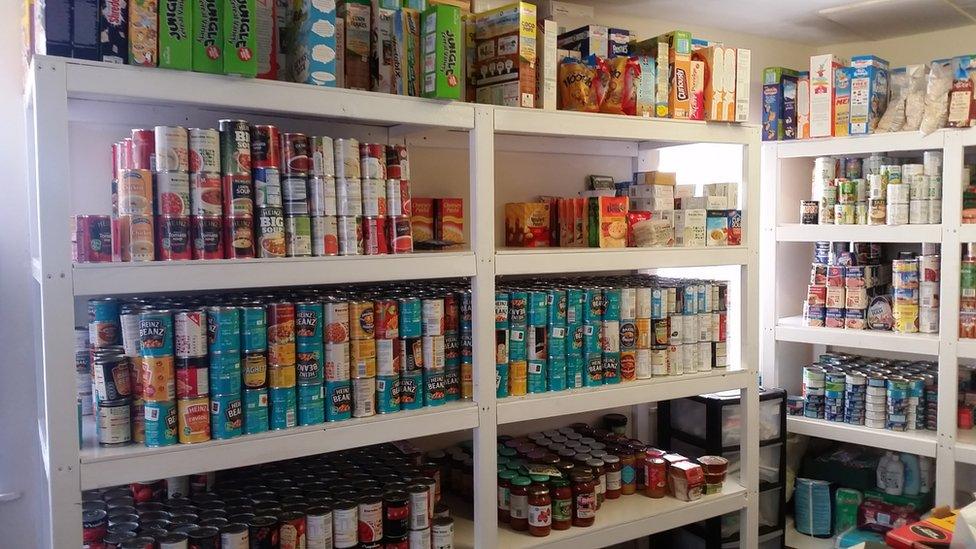
The Trussell Trust runs 52 food banks across Scotland
The Scottish government said it was working to help people affected by welfare cuts and low incomes.
A spokesman said: "A range of actions are needed to stop people having to rely on emergency food provision.
"The Scottish government has taken such action through our £1 million a year Fair Food Fund and more than £100 million a year to mitigate against welfare cuts, including our Scottish Welfare Fund.
"We have also made significant investments in a range of services to support people on low income and to tackle the underlying causes of poverty including investing in affordable housing, increasing free childcare, promoting and paying the real living wage."
- Published15 April 2016
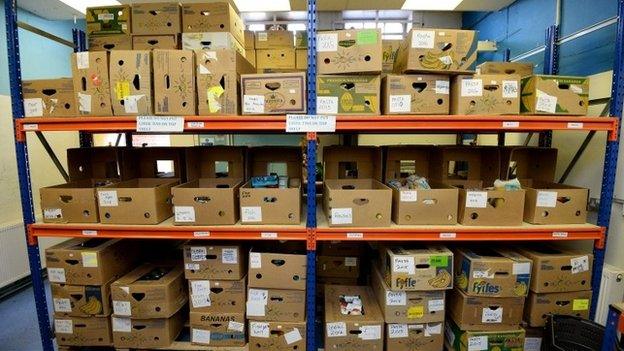
- Published18 November 2015

- Published22 April 2015
